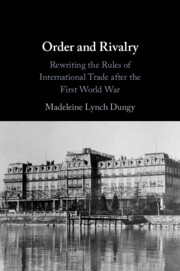Book contents
- Order and Rivalry
- Order and Rivalry
- Copyright page
- Dedication
- Contents
- Acknowledgements
- Organizational Abbreviations
- Introduction
- 1 Organizing Globalization
- 2 The World Economy at War
- 3 Planning the Peace
- 4 From Bilateral to Multilateral Trade Treaties
- 5 Studying the World Economy, from Kiel and from Geneva
- 6 European Unity and Security
- 7 The International Chamber of Commerce and the Politics of Business
- Conclusion
- Bibliography
- Index
Introduction
Published online by Cambridge University Press: 01 June 2023
- Order and Rivalry
- Order and Rivalry
- Copyright page
- Dedication
- Contents
- Acknowledgements
- Organizational Abbreviations
- Introduction
- 1 Organizing Globalization
- 2 The World Economy at War
- 3 Planning the Peace
- 4 From Bilateral to Multilateral Trade Treaties
- 5 Studying the World Economy, from Kiel and from Geneva
- 6 European Unity and Security
- 7 The International Chamber of Commerce and the Politics of Business
- Conclusion
- Bibliography
- Index
Summary
The interwar period marked the end of a dramatic expansion in international trade. The First World War did not destroy the commercial networks that had underpinned nineteenth-century globalization, but it did reroute and repurpose them to serve military ends. It transformed the legal and geopolitical context of international trade by precipitating the collapse of continental empires across much of Eurasia and decentring Europe in global markets.1 From 1913 to 1928, Europe’s share of total world trade dropped by roughly 16 per cent, due to a relative decline in direct imports and exports as well as transit trade.2 In an attempt to give structure to a world economy in flux, many Europeans embraced new multilateral methods in the 1920s, using the League of Nations as their institutional canvas. They disavowed the laissez-faire liberalism of the past, concluding that markets would have to be actively propped open using international rules and institutions.
- Type
- Chapter
- Information
- Order and RivalryRewriting the Rules of International Trade after the First World War, pp. 1 - 17Publisher: Cambridge University PressPrint publication year: 2023

